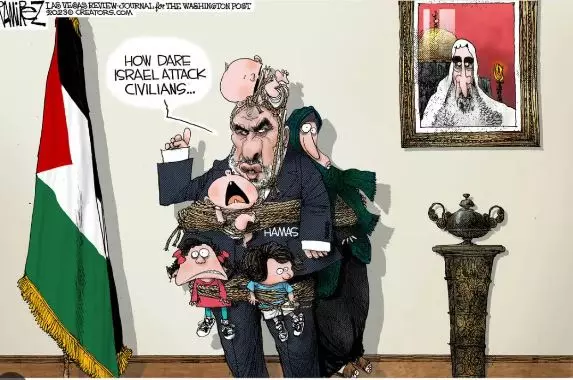
Washington Post cartoon draws criticism for offensive depiction of Arabs and Palestinians
text_fieldsA cartoon published in the Washington Post on November 6 has sparked widespread outrage for its offensive and stereotypical depiction of Arabs and Palestinians. The cartoon, titled "Human Shields," depicts a man with exaggerated features, including a large nose and arched eyebrows, dressed in a suit with the word "Hamas" emblazoned on it.
The man is carrying four children, including a baby on his head, and is accompanied by a veiled and submissive woman, who is meant to represent Palestinian women.
The cartoon has been condemned by critics for its racist and orientalist portrayal of Arabs and Palestinians. They argue that the cartoon reinforces harmful stereotypes and fails to acknowledge the suffering of the Palestinian people. The use of exaggerated features and the depiction of the man as a menacing figure holding children hostage have been particularly criticized.
The cartoonist, Michael Ramirez, a two-time Pulitzer Prize winner, has defended his work, claiming that it is not racist or offensive. He insists that the cartoon is a legitimate commentary on the Israeli-Palestinian conflict and the allegations that Hamas uses human shields.
However, his defense has been met with skepticism, with many questioning his motives and arguing that the cartoon does more to incite hatred than to promote understanding.
The publication of the cartoon has reignited a debate about the role of cartoons in political discourse. Some argue that cartoons should be free to criticize any group or individual, regardless of how offensive their depiction may be. Others maintain that cartoons should be held to a higher standard and should avoid perpetuating harmful stereotypes.
In response to the growing backlash, the Washington Post has acknowledged the controversy surrounding the cartoon and has stated that it is reviewing the matter. The newspaper has not yet announced whether or not it will remove the cartoon from its website or print edition.






















